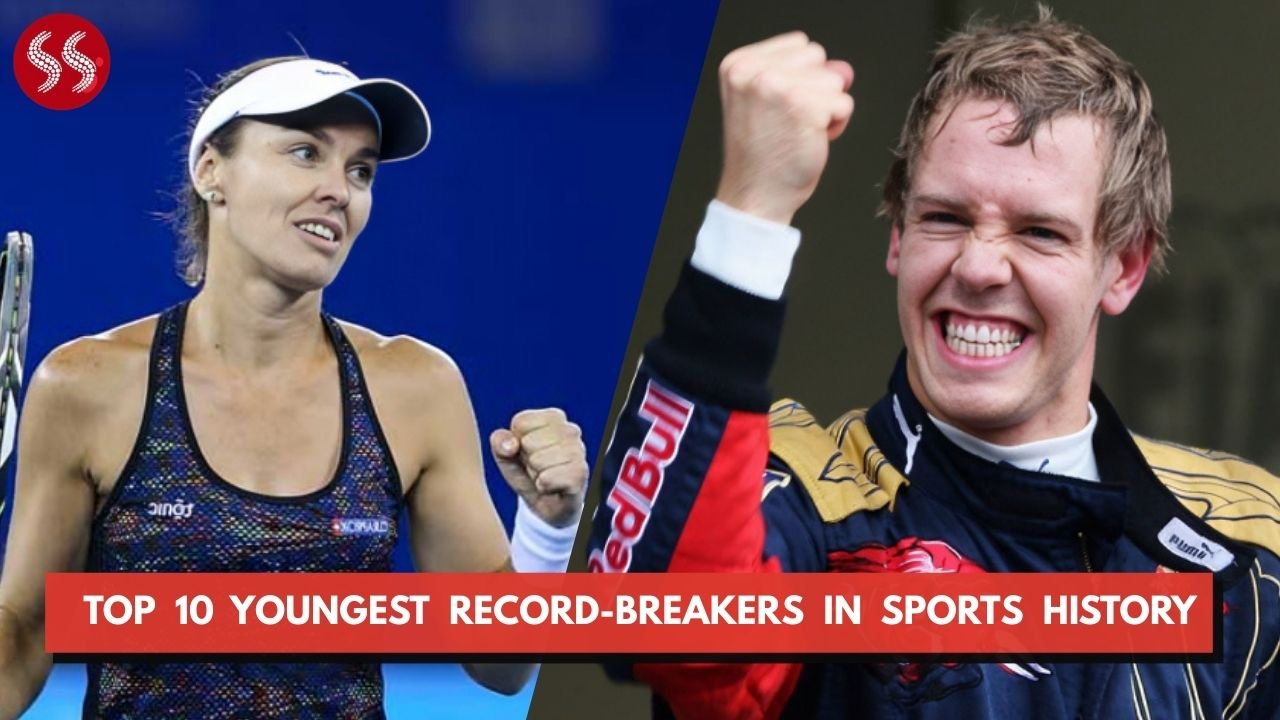The world of athletics has always celebrated extraordinary feats, but there is something uniquely fascinating about the Youngest Record-Breakers in Sports. These prodigies defy age barriers, stepping into arenas dominated by seasoned professionals and proving that raw talent, discipline, and fearlessness can outshine experience. From the Olympic Games to World Cups, from tennis courts to Formula One circuits, history is filled with moments when teenagers stunned the world with their brilliance.
The Youngest Record-Breakers in Sports not only rewrite the record books but also inspire generations, showing that greatness is not bound by age. Their stories go beyond medals and trophies — they embody perseverance, courage, and the will to challenge norms. Whether it was Pelé dazzling at the World Cup or Martina Hingis redefining women’s tennis, the Youngest Record-Breakers in Sports remain timeless examples of early glory and everlasting inspiration.
Here Are The Top 10 Youngest Record-Breakers in Sports History:
10. Ian Thorpe

Ian Thorpe’s 1998 World Championship victory was more than just a breakout—it was the beginning of an era in swimming dominated by “The Thorpedo.” At only 15 years old, Thorpe stunned the world by outpacing seasoned competitors in the 400m freestyle, demonstrating not only raw talent but also an exceptional competitive temperament. His towering frame, remarkable lung capacity, and seamless technique made him a natural in the pool, while his calmness under pressure highlighted his maturity well beyond his age.
That early triumph established Thorpe as the youngest male World Champion in swimming history and set the stage for an extraordinary career. Over the following years, he amassed five Olympic gold medals, broke 13 world records, and became one of the sport’s most iconic figures.Beyond the medals, Thorpe’s emergence shifted the conversation about what teenagers could achieve on the world stage — his training intensity, mental focus, and ability to handle expectations set a new standard for young athletes.
For fans and historians, he remains one of the Youngest Record-Breakers in Sports History, proving that teenage brilliance could dominate the global stage. His victory is still celebrated as a shining example of the Youngest Record-Breakers in Sports History, and Thorpe’s legacy continues to inspire aspiring swimmers who dream of joining the ranks of the Youngest Record-Breakers in Sports History.Thorpe’s success at 15 was not a one-off: he matured into a generational talent who handled pressure and expectation with extraordinary poise, and his 1998 breakthrough remains one of the clearest examples of early mastery in modern elite sports
ALSO READ:
9. Marjorie Gestring
Marjorie Gestring’s name still appears whenever people talk about the youngest Olympic champions ever. At the 1936 Berlin Olympics she won the gold in the springboard diving event at just 13 years old, becoming (and remaining) one of the youngest Olympic gold medalists in history. Winning in Berlin carried weight beyond sporting achievement — the 1936 Games were politically charged and intensely watched — and Gestring’s performance demonstrated an uncommon calm and technical precision despite her youth.
Her gold came after defeating more experienced teammates and rivals; the moment fused youthful daring with disciplined form. While her career trajectory was disrupted by World War II and her return to elite competition was curtailed, Gestring’s 1936 title remains a permanent reminder that prodigious skill and composure can belong to those still in their early teens. To this day, she stands tall among the Youngest Record-Breakers in Sports History, representing how talent can overcome inexperience.
Her performance is often highlighted in discussions of the Youngest Record-Breakers in Sports History, inspiring future generations of athletes. Gestring’s unforgettable triumph remains etched in memory as one of the greatest achievements by the Youngest Record-Breakers in Sports History. Gestring’s achievement is a reminder that age and experience aren’t the only determinants of success; sometimes talent, opportunity and the right mindset converge to produce a champion well before adulthood.
8. Ronnie O’Sullivan

Ronnie O’Sullivan arrived as a snooker prodigy and quickly validated the hype. By the age of 17 he had won a professional ranking tournament — a milestone that marked him as the youngest to do so and a sign of the long, decorated career that would follow. O’Sullivan’s style combined lightning cue-work, an instinctive feel for break-building, and an often mercurial temperament.
From childhood century breaks to maximums as a teenager, his capacity for high-level scoring under pressure made him a media favourite and a generational talent in the modern era of snooker. Beyond individual trophies, O’Sullivan’s early breakthrough helped popularize snooker and accelerated his rise into the sport’s elite; he would go on to multiple World Championships and remain a standard-bearer for natural ability in cue sport. The confidence and skill he displayed as a teenager were clear indicators that his name would be written among the all-time greats.
As one of the Youngest Record-Breakers in Sports History, O’Sullivan’s early success showed that prodigious talent could dominate even in cerebral, technical sports. His thrilling style and composure mark him as a true icon among the Youngest Record-Breakers in Sports History, inspiring future snooker stars. O’Sullivan’s teenage triumph remains a timeless example of how the Youngest Record-Breakers in Sports History can change the trajectory of an entire sport.
7 — Barbara Jones (15 years and 4 months)
Barbara Jones’s gold as part of the USA’s 4x100m relay team at the 1952 Helsinki Olympics made her one of the youngest track-and-field Olympic gold medalists. At roughly 15 years old, Jones ran with the collective precision and explosive speed required at the highest level, and her contribution helped the United States secure a major medal haul during the Cold War-era competition.
Relay races reward not only raw velocity but also seamless teamwork and baton-handling skill; Jones’s youth did not undermine her ability to perform those essentials on the most intimidating stage. Beyond the medal itself, Jones’s presence on the squad symbolized how national programs could identify and fast-track exceptional teenage talent, especially in sprint events where youthful explosiveness can be decisive.
She later returned to success in subsequent competitions, providing continuity between teenage promise and later achievement. Jones’s story stands proudly among the Youngest Record-Breakers in Sports History, proving that teenagers could shine even under Olympic pressure. Her dazzling sprinting abilities established her as one of the most remarkable Youngest Record-Breakers in Sports History, inspiring countless young athletes. Even decades later, her achievement remains a defining chapter in the legacy of the Youngest Record-Breakers in Sports History.
6. Aaqib Javed

Aaqib Javed’s role in Pakistan’s 1992 World Cup triumph stands as one of the most remarkable teenage stories in cricket. At just 19, he became the youngest World Cup winner, showcasing composure far beyond his age. Stepping up in Waqar Younis’s absence, Javed thrived under pressure, using his natural ability to swing the ball both ways to outsmart top-order batsmen. His knack for breakthroughs at pivotal stages, particularly in the final against England at the MCG, proved invaluable to Pakistan’s campaign.
Surrounded by legendary teammates like Imran Khan and Wasim Akram, Javed carved out his own significance, leaving a lasting mark as a fearless young bowler who helped deliver Pakistan’s first-ever World Cup crown.That victory was formative for Pakistan cricket and for Javed’s own career: he would go on to be remembered as an effective one-day specialist who could deliver on big stages. The young bowler’s role in a World Cup-winning campaign highlights how team sports allow teenagers to share glory when they have the skill set and temperament required.
Javed will forever be remembered among the Youngest Record-Breakers in Sports History, representing the impact a teenager can have on the grandest stage. His early triumph remains one of the finest examples of the Youngest Record-Breakers in Sports History excelling under immense international pressure.
5. Boris Becker
Boris Becker’s Wimbledon victory in 1985 stands as one of the most iconic teenage breakthroughs in tennis history. At just 17, the unseeded Becker stunned the tennis world by powering past seasoned grass-court specialists with fearless aggression, booming serves, and relentless net approaches. His triumph was historic on multiple levels: not only did he become the youngest Wimbledon men’s singles champion at that time, but he was also the first German ever to lift the prestigious trophy.
Becker’s charismatic style, confidence, and refusal to be intimidated by more experienced opponents cemented his victory as a turning point for youth in professional tennis.Becker’s aggressive serve-and-volley style was tailor-made for Wimbledon’s fast grass, allowing him to dominate with power, precision, and fearlessness well beyond his years. His 1985 breakthrough wasn’t just a singular upset—it became the foundation for a career that delivered three Wimbledon titles and cemented his legacy among the sport’s greats.
More importantly, that youthful triumph shifted the perception of what teenagers could achieve on the biggest stages. Tennis academies and national programs began to see Becker as proof that a teenager, armed with confidence, tactical courage, and physical maturity, could succeed at the very highest level. His run remains a defining reference point for prodigies whose early brilliance reshapes the trajectory of the sport itself.
4. Sebastian Vettel

Sebastian Vettel’s rise in Formula One included becoming the youngest World Champion at the end of the 2010 season, a milestone that symbolized a generational shift in F1. Vettel had already made headlines by becoming one of the youngest race winners and a rapid riser in the Red Bull program; his Abu Dhabi race win in 2010 clinched the title and displaced previous records for youthful success in the sport.
Formula One championships require not only raw speed but also consistent performance across a season, strategic acumen, and a top-tier team effort; Vettel’s 2010 triumph reflected his maturation into a driver who could string wins and podiums together and navigate a pressure-packed championship finale. Over the next few years, Sebastian Vettel transformed his early Formula One success into a period of remarkable dominance, becoming the youngest four-time World Champion in the sport’s history.
His rapid rise showcased not only extraordinary driving skill but also how modern motorsport academies and development systems could nurture prodigious talent into world-class champions. Vettel’s achievements remain iconic, representing one of the most celebrated chapters among the Youngest Record-Breakers in Sports History. By consistently outperforming rivals with precision, adaptability, and fearless racing, he redefined what youth could accomplish in Formula One. Even today, whenever discussions emerge about the Youngest Record-Breakers in Sports History, Vettel’s name stands as a benchmark of early brilliance and a trailblazer for future drivers.
3. Tiger Woods
Tiger Woods’s first major win — the 1997 Masters at Augusta — made him the youngest player at that time to win a major championship, and it announced to the sporting world that a transcendent talent had arrived. Woods combined prodigious drive power, exceptional short game, and an intense competitive mentality that was unusual even among the top pros. His victory at Augusta was not just an individual triumph: it reset expectations for what youthful dominance could look like in golf, a sport where many champions matured later.
Woods would go on to build one of the most dominant careers in sports history, but the 1997 Masters remains a watershed: it was the point where talent, preparation, and belief collided spectacularly. That young major breakthrough also changed how junior players were identified and supported, as tours and sponsors began to invest more in teens who showed major-winning potential. His victory solidified him as one of the Youngest Record-Breakers in Sports History, breaking barriers in a traditionally older sport.
Tiger’s triumph at Augusta is often used as an example of the Youngest Record-Breakers in Sports History, demonstrating how youth can redefine an entire discipline. Even decades later, his first Masters win continues to inspire discussions of the Youngest Record-Breakers in Sports History, reminding the world of what youthful brilliance can achieve.
2. Pelé
Pelé’s emergence in the 1958 World Cup remains one of the defining stories of football history. At just 17, he carried the exuberance of youth but played with the confidence of a seasoned veteran. His semi-final hat-trick against France announced him to the world, and in the final, his two goals sealed Brazil’s first World Cup triumph.
Beyond statistics, Pelé’s flair, vision, and fearless attacking style reshaped how the sport was played and perceived internationally. As a teenager, he symbolized the fusion of natural brilliance and competitive maturity, marking him as one of the greatest Youngest Record-Breakers in Sports History and inspiring generations of players to believe age was no barrier to global greatness.
The fact that Pelé was only 17 when he hoisted the World Cup trophy underscores how quickly some athletes can, through sheer talent and match temperament, ascend to the absolute top of a team sport. Pelé’s early success also influenced how nations looked at youth in football — his rise encouraged managers to trust youthful flair in crucial tournaments.His World Cup triumph remains a benchmark for prodigies who not only perform as teenagers but carry entire national hopes to the highest prize.
1. Martina Hingis

Martina Hingis’s string of youngest-ever records in the 1990s made her the archetype of tennis prodigy brilliance. At 15 she won a junior Grand Slam and then, in 1996 at Wimbledon (doubles) and in 1997 in singles (Australian Open), she became the youngest Grand Slam champion in the 20th century and the youngest world No. 1. Hingis combined court awareness, a preternatural sense for angles, and a tactical brain that allowed her to out-think physically stronger opponents.
Her early career was defined by a steady accumulation of major titles and top ranking while still in her mid-teens. Hingis’s achievements changed how the tennis world thought about youth development: it was proof that tactical brilliance, anticipation, and footwork could make a teenager dominant even against more physically mature rivals.
While injuries later affected her singles career, her teenage run remains one of the clearest examples of the Youngest Record-Breakers in Sports History. Hingis is often cited among the Youngest Record-Breakers in Sports History because of how decisively she conquered both singles and doubles. Her career continues to inspire the Youngest Record-Breakers in Sports History, showing that skill and intellect can overcome age barriers on the global stage.
FAQs
Q1: Who is considered the youngest Olympic gold medalist in history?
Barbara Jones, only 15 years old, became one of the youngest Olympic champions when she won gold in the 4x100m relay at the 1952 Helsinki Olympics. Her remarkable achievement symbolized youthful excellence on the global stage, proving that teenage athletes could thrive under pressure and inspire future generations.
Q2: Why are the Youngest Record-Breakers in Sports so inspirational?
They prove that age is no barrier to success, as their achievements highlight how talent, discipline, and opportunity can enable teenagers to excel. These remarkable performances demonstrate that even the youngest athletes can dominate at the very highest level.
Q3: Which sports produce the most Youngest Record-Breakers in Sports history?
Sports such as gymnastics, tennis, swimming, and sprinting often produce record-breakers at younger ages. These disciplines reward agility, sharp reflexes, and early physical development, allowing talented teenagers to compete successfully against older, more experienced athletes on the world’s biggest sporting stages.
READ MORE:


